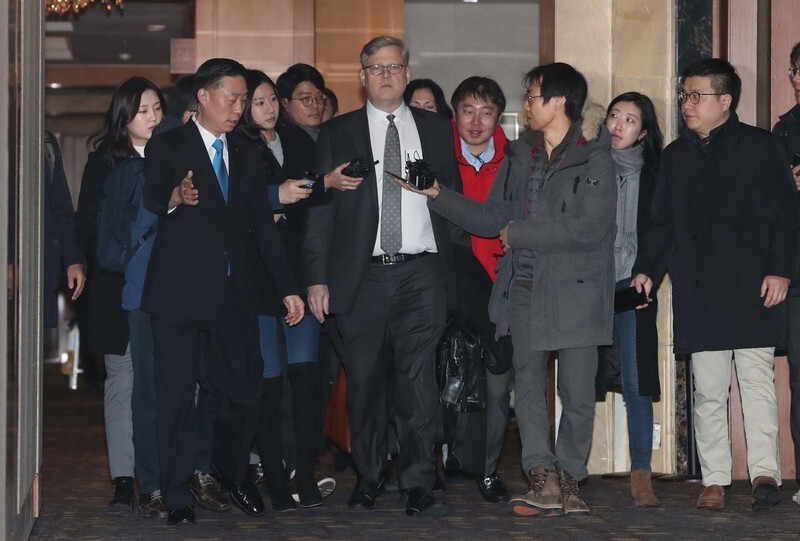hankyoreh
Links to other country sites 다른 나라 사이트 링크
South Korea denies that foreign exchange policies were included in KORUS FTA talks

The US government reported receiving a promise from Seoul to refrain from future foreign exchange market intervention during its recent negotiations on steel tariffs and amendment of the South Korea-US Free Trade Agreement (KORUS FTA). But the South Korean government responded that the two sides’ discussions on foreign exchange policies had been separate from the KORUS FTA talks.
Reports on Mar. 27 by Reuters and other news outlets quoted senior US government officials as saying South Korea and the US had reached an additional agreement concerning exchange rate policy during their FTA amendment discussions. According to the reports, Seoul agreed to adopt measures to increase the transparency of its foreign exchange market interventions and avoid competitive devaluation of the won. The officials reported that the details were still being negotiated by the US Treasury Department and South Korean Ministry of Strategy and Finance (MOSF).
But South Korean Minister for Trade Kim Hyun-chong made no mention of exchange rate policy in a Mar. 26 briefing on the outcome of the South Korea-US FTA and steel talks.
“The currency rate bears no direct connection to the KORUS FTA,” an Office of the Minister for Trade senior official said on Mar. 28.
“The exchange rate did not come up during discussions with the US Trade Representative,” the official added, indicating that the exchange rate issue was discussed on a separate track in talks between the MOSF and the US Treasury Department.
An MOSF senior official also said that “exchange rate reports and other foreign exchange-related issues have historically been discussed on a periodic basis in the past with the IMF and US Treasury Department.”
“Discussions are under way with financial officials on both sides and the IMF and are separate from the KORUS FTA amendment negotiations, which have already essentially been concluded,” the official said.
But the two sides’ exchange rate talks appear very likely to have been part of a “package deal” between the two sides in their recent KORUS FTA and steel tariff talks, reached through a separate discussion and agreement. Analysts are speculating the South Korean side may have offered to deter won devaluation activities in the future through greater transparency about its foreign exchange market interventions in an attempt to achieve a breakthrough on trade issues.
In the past, the South Korean government and Bank of Korea have intervened in the foreign exchange market with “smoothing operations” involving the buying or selling of US dollars to prevent the value of the won from fluctuating greatly. While it has not publicly shared the details of its foreign exchange market interventions since that market was opened in 1962, the IMF issued a recommendation last month for it to divulge them.
The US Treasury Department is also scheduled to publish exchange rate reports in April and October including individual countries’ designation as “currency manipulators.” The South Korean government is currently considering going public with the details of its foreign exchange market interventions to avoid this designation. Adoption of this information disclosure approach could yield an effect in deterring foreign exchange market intervention by authorities.
By Jung Eun-joo and Chok Kye-wan, staff reporters
Please direct questions or comments to [english@hani.co.kr]

Editorial・opinion
![[Column] Season 2 of special prosecutor probe may be coming to Korea soon [Column] Season 2 of special prosecutor probe may be coming to Korea soon](https://flexible.img.hani.co.kr/flexible/normal/500/300/imgdb/original/2024/0426/3317141030699447.jpg) [Column] Season 2 of special prosecutor probe may be coming to Korea soon
[Column] Season 2 of special prosecutor probe may be coming to Korea soon![[Column] Park Geun-hye déjà vu in Yoon Suk-yeol [Column] Park Geun-hye déjà vu in Yoon Suk-yeol](https://flexible.img.hani.co.kr/flexible/normal/500/300/imgdb/original/2024/0424/651713945113788.jpg) [Column] Park Geun-hye déjà vu in Yoon Suk-yeol
[Column] Park Geun-hye déjà vu in Yoon Suk-yeol- [Editorial] New weight of N. Korea’s nuclear threats makes dialogue all the more urgent
- [Guest essay] The real reason Korea’s new right wants to dub Rhee a founding father
- [Column] ‘Choson’: Is it time we start referring to N. Korea in its own terms?
- [Editorial] Japan’s rewriting of history with Korea has gone too far
- [Column] The president’s questionable capacity for dialogue
- [Column] Are chaebol firms just pizza pies for families to divvy up as they please?
- [Column] Has Korea, too, crossed the Rubicon on China?
- [Correspondent’s column] In Japan’s alliance with US, echoes of its past alliances with UK
Most viewed articles
- 1Samsung subcontractor worker commits suicide from work stress
- 2‘We must say no’: Seoul defense chief on Korean, USFK involvement in hypothetical Taiwan crisis
- 3[Editorial] Korea’s surprise Q1 growth requires objective assessment, not blind fanfare
- 4Division commander ordered troops to enter raging flood waters before Marine died, survivor says
- 5Is Japan about to snatch control of Line messenger from Korea’s Naver?
- 6No good, very bad game for Korea puts it out of Olympics for first time since 1988
- 7US overtakes China as Korea’s top export market, prompting trade sanction jitters
- 8N. Korean delegation’s trip to Iran shows how Pyongyang is leveraging ties with Moscow
- 9Korea’s 1.3% growth in Q1 signals ‘textbook’ return to growth, says government
- 10[Column] Season 2 of special prosecutor probe may be coming to Korea soon